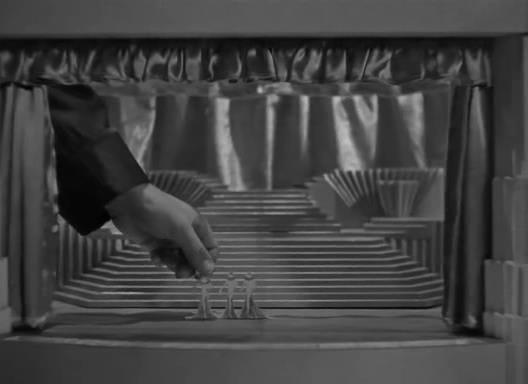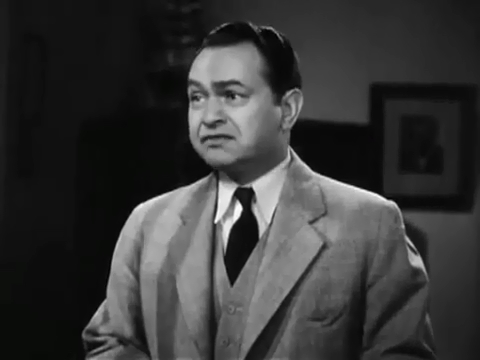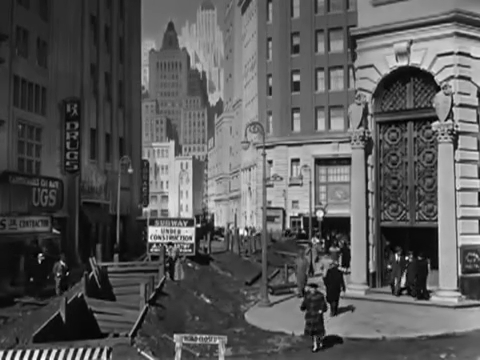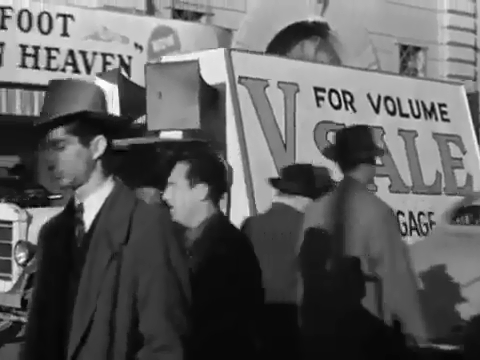Fireman, Save My Child
The
double career of “Smokey Joe” Joseph Acumula Grant,
star pitcher of the Rosedale Rosies and local
fireman, he and his men lose a notable building before he accepts an offer from
the St. Louis Cardinals for the money to marry his girl and bring his “fire
extinguisher bomb” to fruition.
A
couple of teammates unload a gold digger on him (she knows an expensive patent
attorney), he shakes her like a bad cold and sells his invention to the Zenith
Fire Extinguisher Co. of St. Louis and wins the World Series against New York
and, in an honorary big-city battalion chief’s hat, gets married.
His
voice is like Goofy’s, “a guy like I”, his great
flailing windup is seen advertising small businesses coast-to-coast in this
latter day, a hero of the Middle West to whom baseball isn’t “serious”, his
winning run is scored unconscious like Col. Nicholson in David Lean’s The Bridge on the River Kwai.
Marcel
Varnel’s Where’s that fire? followed in due
course, as Halliwell’s Film Guide
would say, “thin” is its considered judgment, however. Leonard
Maltin, “amusing”.
“Five
thousand berries,” Joe E. Brown joyfully exclaims upon signing the contract,
forefather to Steve Martin in Carl Reiner’s The
Jerk.
42nd
Street

The great film
masterpiece on a Depression hit and the making of a star strictly from
desperation. Nothing, not even Ken Russell’s Savage Messiah, like it for the artist
(Warner Baxter) in the throes (cf.
Truffaut’s La Nuit
américaine).
M.H. of the New York Times, “there was a time when
spectators were satiated with backstage stuff, but here it is pictured brightly
and with a degree of authenticity that makes it diverting,” as Max Ophuls notes carefully in Divine (“nor I without you,” noted in
Kazan’s The Last Tycoon). Variety, “as authentic to the
initiate as the novitiate.”
“So this is
Philadelphia,” under its Mahatma. Leonard Maltin, “definitive”.
“So that’s it, is
it, you small-town big shot?” Geoff Andrew (Time Out), “a thin and hackneyed affair...
mischievous dexterity.”
Exactly one year later, Hawks’ Twentieth Century picks up the note.
Dave Kehr (Chicago Reader),
“self-conscious and campy.” The Boy Friend (dir. Ken Russell) of course, and famously, but also
All About Eve (dir. Joseph L.
Mankiewicz). TV
Guide, “hard to beat.” If truth be told, Serling
and Frankenheimer have The Comedian
for live television (Playhouse 90). Busby Berkeley. The critics.
Hal Erickson (All Movie Guide), “quintessential”. Albee speaks of “swimming in polluted water with sharks,”
when was it any different? A film with echoes down to
Altman’s The Company. Halliwell’s Film Guide, “archetypal”.
Footlight Parade
The burden of
musical prologues to the new talking pictures falls on Chester Kent, whose
headache clues him in to mass production. There’s a spy in his soup, and a
cultured floozy, a censor’s factotum, thieving partners, the ex-wife, dance
directors, hoofers by the score, a tenor in the family business, a brainy
assistant who gets her hair done and dances, and a personal secretary binding
the wounds.
Big contract,
three shows in no time, to beat the copycat competition.
Bacon &
Berkeley, unbeatable.
“Dull and
turgid,” said Andre Sennwald, New York Times.
Brother Orchid
An incredibly
funny shaft at the protection racket (Arturo Ui was in it, according to
Brecht). The gags and the actors are met by Bacon’s swift sure technique, the
thing has no gravity beyond what’s given it in perfect measure.
The year before Citizen
Kane, Little John Sarto is the gull of Europe, his own mob try to rub him out, the Floracian Brothers make him one of their own,
tending zinnias.
Class, that’s
what he’s after. His hat check girl owns the joint now with a Western protector
who’s shy in front of ladies, “you have to feel your way,” says she.
A clear case of
evolution at work, the sun hits the slime, man walks.
Knute Rockne All American
Nowadays all
sport is business, and America sends pros to the Olympics. “The past is a
foreign country,” where long ago football had to be invented in its various
aspects. That’s just the sporting side of it, which if it is meaningful has
several connotations for academic life in that, properly speaking, there is a
certain amount of study and preparation, and a certain amount of creative work
as well.
Larceny,
Inc.

Bacon’s baseball
(Fireman, Save My Child) and his
underworld (Brother Orchid) in a
grand summation.
Crime doesn’t
pay, Sylvia Sidney proves it arithmetically in Fritz Lang’s You and Me, anyway
the business of America is business, isn’t it?
J. Chalmers
Maxwell to the world, “Pressure” to his intimates, who can con the pinstripes
off a warden. Or say of him, in Sing Sing he plays ball, outside he’s ready to play a part in
society, costume and everything, “well, the suit was easy, it was the tie that
was tough.”

“Why, bank loans
are the backbone o’ the nation!” Collateral for a Florida dog track (cf. Wyler’s The Best Years of Our Lives not long afterward), “well, that’s the
only way you can avail yourself of our funds.”
“Brother, that’s
what you think... knifing business in
the back, that’s what they’re doing, sabotaging American industry!” The subway is straight out of The Mad Miss Manton (dir. Leigh Jason), literally a hole in the
ground.
“That
hit-and-settle game” at Park Avenue and 57th Street for a down payment on the
luggage shop next door to the bank (Spring 1942 premiere).

Small Time Crooks (dir. Woody Allen), even to the water pipe “and a very ass-toot
businessman, too.” From funny, Bacon is the whole hog. Business on Sixth Avenue is dying with the construction
and turns to Pressure (cf. Bolognini’s Arabella),
a sort of would-be son-in-law in the industry wants to help the shop “zoom”...
a comedy of the drug store counter and the barber shop, Main Street, “you
should have been a senator!”
“Senator? Governor!” It’s the sort-of daughter’s idea to take up her
suitor’s offer and “keep that store busy every minute.” The
screenwriters, working from a Perelman play, put everything but everything in
it.

Dassin (Rififi) and his
imitators remember the exploit, Becker (Le
Trou) among them. A truly
monstrous film in its picture of the times, but c’est la guerre. The initiator of the scheme
breaks out to see it through, there’s genius for you, “why, you guys couldn’t
steal a towel out of a hotel without my help.” A
deeply-studied film down the years, repaying every attention (cf. for example the ending of Raoul Lévy’s The Defector). Homage to The Three Stooges (cf. John Ford’s Up the River).
Bosley Crowther of the New
York Times blamed the Perelmans, “it is somewhat
forced, somewhat obvious and there are repetitious stretches here and there. Also the dialogue is not quite as brisk and clever as such
farce dialogue should be. But the characters are
whimsically assorted and generally well played”. Leonard
Maltin, “hilarious little comedy”. Sandra
Brennan (All Movie Guide), “parody of
gangster flicks”. Halliwell’s
Film Guide, “tepid comedy-drama”.
Action in the North Atlantic
The officers and
crew of the freighter Northern Star, torpedoed, sunk and rammed in their
lifeboat, join the U.S. Merchant Marine on convoy duty in a well-armed Liberty
ship bound for Murmansk.
That
is the plain facts, the filming is incredibly elaborate, far beyond most
efforts in this direction, above and beyond most films in general.
The
directorial imperative takes precedence even over a cast such as this, no mean
feat but a wartime exigency.
Bacon
comes out of it with war supplies for the Russian ally and a long trip home
contemplated in weariness.
The Fighting Sullivans
The principal reason
is a historical one, but these are Rockne’s Four Horsemen, or rather Five, in
their offensive, spiritual materialization.
The ordinary
things, the poetry of the backyard, the clothesline, breakfast table, dinner
table, reading the Sunday funnies on the living room floor, the dog, adventures
and escapades, the girl you marry, first child, all that and a hundred other
things.
The Jap attack,
enlistment, the Juneau, the Solomons, USS The Sullivans.
Miss Grant Takes Richmond
The other front
office stunt, a receptionist who can’t type or anything and too dumb to find
out the real estate firm is a bookie joint.
Newlyweds and
families are clamoring for low-cost housing, they get the brush, she perseveres
on their behalf.
A thoroughgoing
exposé of the building rackets generally, or how the postwar housing crunch was
solved.
Ball at her best,
Holden brilliant, Gleason and McHugh very dapper.
The Frogmen
After Iwo Jima,
UDT men with a new commander.
Reconnaissance
and obstacle-clearing.
The last mission
is submarine pens near the home islands.
Admiring critics
could not follow the plot, called it germane in an unnecessary way, and missed
the point.
The jocular
skipper late lamented left a portraitist among them, the “blue eyes” and
“granite chin” cannot be captured but by determined effort, and so... “stress
is on realism... story line is slight and rather commonplace” (Variety),
which is the slight and rather commonplace realism of the philistine who thinks
a work of art is very easy.